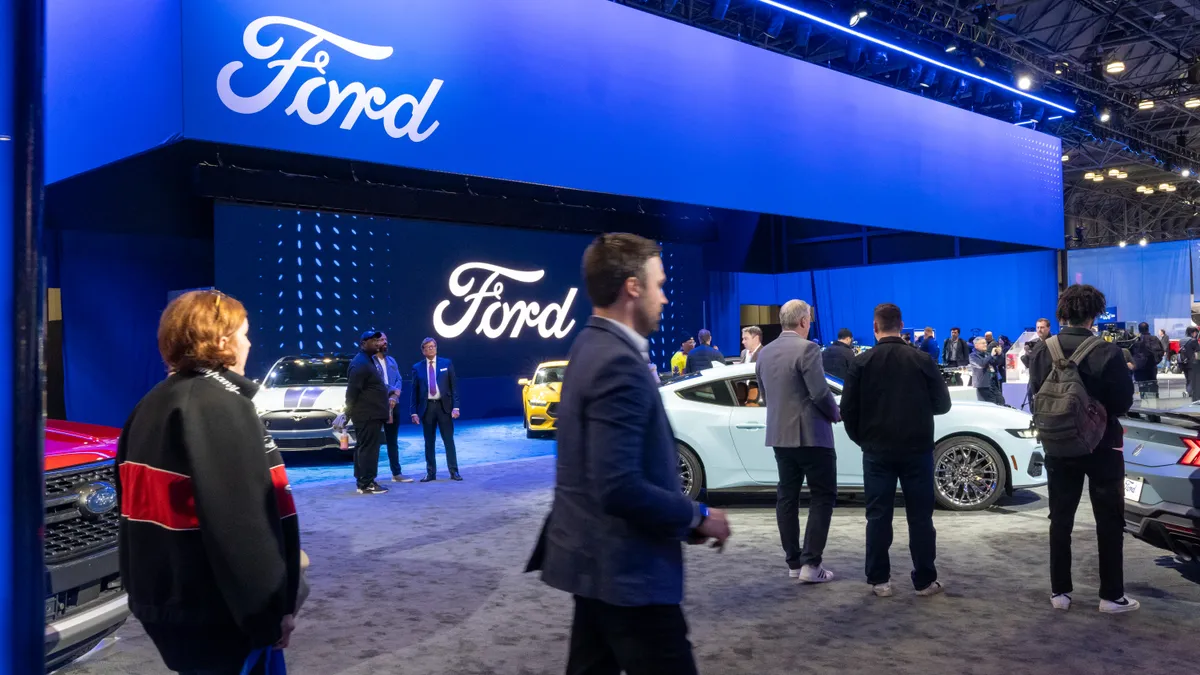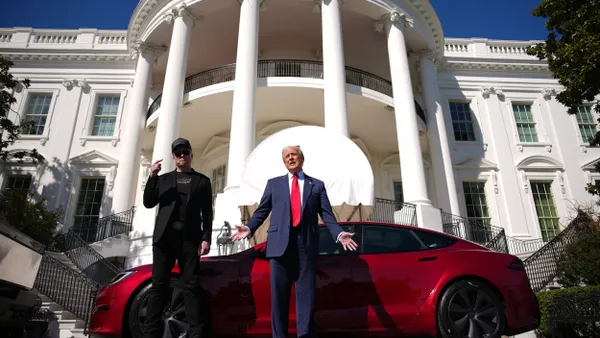Dive Brief:
- Automaker Ford Motor Company announced plans to shuffle its financial leadership ahead of a coming growth push, appointing CFO John Lawler as vice chair and noting former Lucid Motors executive Sherry House will join as vice president of finance.
- Both appointments will be effective in early June, with Lawler to retain his role as finance chief before House transitions into the position early next year, according to a Friday announcement by the Dearborn, Michigan-based company.
- House, who most recently served as CFO for luxury electric vehicle maker Lucid Motors, will take Ford’s financial helm as the company grapples with shareholder concerns and wider industry questions about the viability of electric vehicles.
Dive Insight:
Prior to joining Lucid Motors in 2021, House logged a three-year tenure at Alphabet’s self-driving subsidiary Waymo, where she served in a variety of roles including treasurer and head of investor relations, according to her LinkedIn profile. She departed Lucid in December 2023 to “pursue other opportunities,” according to a release by the EV maker at the time.
In joining Ford as VP of finance, House will receive an annual base salary of $900,000, according to a company filing with the Securities and Exchange Commission. She will also receive a sign-on bonus of $4.2 million, with $1.2 million of that bonus to be paid in cash and $3 million paid in restricted stock units. House will be eligible to receive a target annual bonus of 125% of her annual base salary, according to the filing.
Ford did not specify when next year House will move to the CFO position, noting in the filing that she would do so following a “period of transition working with Mr. Lawler.” Lawler, 57, will continue with his role as CFO — a position he has held since 2020 — while assuming new duties as vice chair, according to the filing.
A 34-year veteran of Ford Motors, Lawler’s additional responsibilities as vice chair will include taking the lead on future strategy choices, as well as working to “fully leverage partnerships, and liaise with leaders on industry-critical policy around the globe,” Ford said in its Friday announcement.
In association with the vice chair appointment, Ford increased Lawler’s annual target bonus to 150% of his base salary, with his salary remaining unchanged at approximately $1.2 million.
Lawler also received increases in his annual stock award target and retirement plan contribution, as well as authorization to use Ford aircraft “subject to the Company’s policy for personal use,” according to the company filing.
The CFO shift comes as Ford and other automakers deal with a rise in questions surrounding the future of the EV market. Ford reported an EBIT $1.3 billion loss for its Ford Model e segment — the division of the company focused on developing EVs — during its first quarter of 2024.
Ford reported strong results for other areas of the business, with its Ford Pro arm — the division focusing on commercial fleets and B2B software — reporting a 36% jump in revenue to reach $18 billion for the quarter ended March 31. Hybrid vehicle sales in its Ford Blue unit also climbed, although wholesale and revenue for the segment were down overall, according to the company’s earnings results. Overall, Ford reported net income fell to $1.3 billion from $1.7 billion in the year-earlier period.
CEO Jim Farley expressed confidence that the company would build a “sustainably profitable EV business with terminal value,” noting that costs for the Model e segment were flat year-over-year and that the turning point “will be the profitability in our next cycle of products,” he said during Ford’s first quarter earnings call.
However, Farley also noted that the EV segment was “the main drag on the company right now, as it will be for the whole industry,” he said during the call. Ford is also considering walking back its plans to offer all-electric vehicles only in Europe amid slowing adoption of EVs in the region, a shift from the EV-only strategy it outlined in 2021, Reuters recently reported.
Ford is far from the only automaker experiencing EV woes. Price cuts, a political tug-of-war over environmental initiatives and a lack of charging infrastructure is leading to a slump in overall EV demand, contributing to waning sales in the space and squeezing financials at players such as Rivian and Fisker, according to a write-up by The Verge.
For example, shares of House’s former employer Lucid Motors plummeted earlier this week after the luxury EV maker warned of liquidity challenges, with Lucid noting that current cash flows and sources would “provide us with adequate liquidity for at least the next 12 months,” according to its most recent earnings report. For the quarter ended March 31, Lucid reported cash and cash equivalents of $4.6 billion.
EV darling Tesla, meanwhile, recently reported its lowest profit in six years, with the Elon Musk-led company announcing plans to slash its workforce by more than 10% — recently laying off much of its Supercharger network team, the group responsible for creating its charging network despite plans to spend half a billion on the network, The Wall Street Journal reported.
Ford did not immediately respond to requests for comment.











